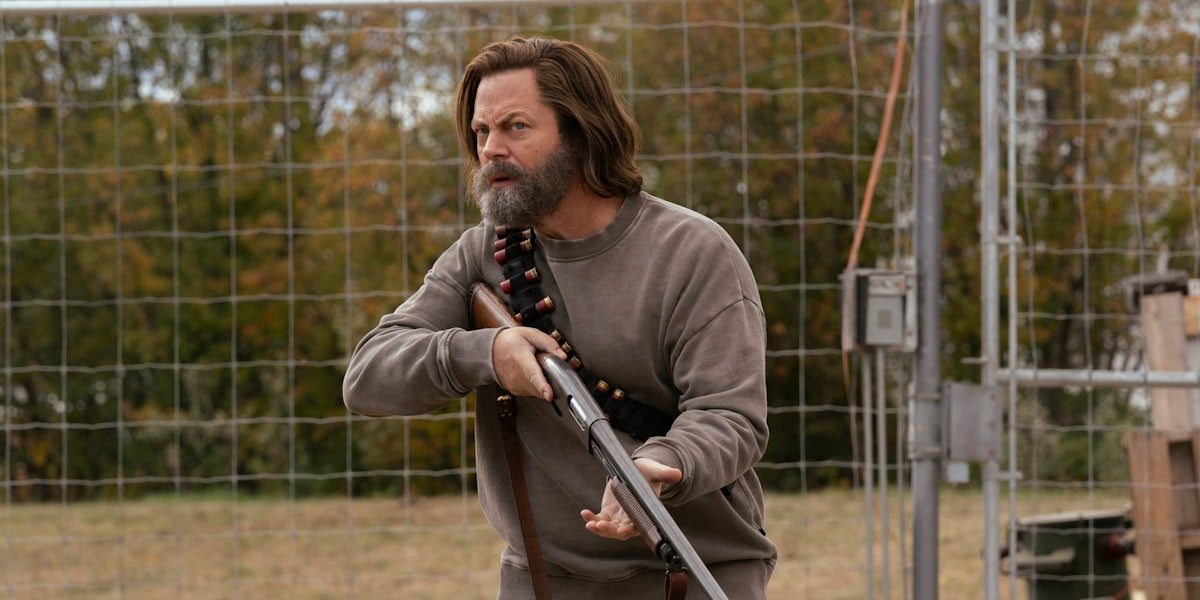This post includes spoilers for The Last of Us episode 3.
Everyone is talking about Sunday’s episode of The Last of Us. Right now that means the heartbreaking standalone story featuring Nick Offerman and Murray Bartlett, but this statement was equally true last week and the week before, and will most likely continue for the rest of the season. The Last of Us is a true watercooler hit, with HBO reaffirming that prestige TV can be fun and critically acclaimed and get great ratings—as long as it’s marketed and released correctly.
Those last two factors are notably absent at streaming services like Netflix, where good and/or expensive shows regularly vanish without trace.
Despite the behind-the-scenes problems at Warner Bros, HBO still corners the market on appointment TV: Succession, Euphoria, House of the Dragon, The White Lotus, and now The Last of Us. These dramas combine glossy entertainment with (mostly) mature, intelligent storytelling. And crucially they air week-by-week, building a conversation around each episode. Disney+ found similar success by serializing its Marvel and Star Wars spinoffs, whereas Netflix’s release-it-all-at-once strategy is looking worse and worse by the moment.
Netflix’s release model is a common bugbear among TV critics, giving shows a shorter shelf-life and warping how they get made in the first place. Netflix is notorious for canceling new titles because they didn’t find an audience within one or two weeks. In order to get renewed, Netflix shows must be geared toward binge-watching, either relying on strategically placed cliffhangers or making content that is easy to watch in the background of daily life—a trait that isn’t exactly conducive to good storytelling.
Of course, this doesn’t necessarily work, anyway. Netflix is still canceling stuff left and right, and only a small handful of hits manage to dominate the public conversation: Stranger Things, Bridgerton, Squid Game. The vast majority of Netflix releases aren’t given a chance to breathe, swiftly overshadowed by a deluge of mediocrity competing for the same eyeballs.
The Last of Us‘ third episode really drives home the difference between HBO and Netflix’s priorities. As a whole, TLOU is a TV executive’s wet dream: A popular IP adaptation that’s adored by longtime fans and new viewers alike. Building on an admittedly formulaic foundation of post-apocalyptic zombie tropes, TLOU takes itself seriously, utilizing a top-tier cast to explore a story with emotional depth. The showrunners had free rein to make bold creative choices. Like, for example, pausing the main plot after two episodes to focus on a romantic side-story that barely features the lead characters.
Episode 3 expands two of the game’s background players into a heartwarming love story, prompting comparisons to the tear-jerking intro to Pixar’s Up. Despite introducing a pair of gay characters just to kill them off, this story is so well-executed that it’s largely avoided a backlash of “bury your gays” discourse. Fans are already demanding that Nick Offerman and Murray Bartlett receive Emmy nominations, and there’s a wide range of analysis digging into the episode’s themes, ranging from straight guys saying it changed their view of queer storytelling, to commentary on Offerman’s satire and/or subversion of masculine survivalist tropes, to critiques of how the show transforms a grim, complicated subplot (in the game) into something far more sentimental.
It took less than 24 hours for these conversations to emerge and spark their own rebuttals and analyses; something that can only happen when a single episode is treated as an important event, both by the audience and (let’s be real here) by the show’s publicity department. At the risk of hammering home a point that dozens of critics have made before: People enjoy watching the same media at the same time! They want to talk about their favorite shows! And that’s a lot harder to do when Netflix releases 10 episodes at once, leaving you to either marathon it in one weekend or risk getting spoiled.
Shows like The Last of Us close the gap between viewers and critics. They remind us that mainstream audiences actually do want thought-provoking TV—and that “thought-provoking” doesn’t have to mean harrowing or experimental. In many ways, The Last of Us is conventional fare. Some of its strongest elements—episodic storytelling, prestigious guest stars, Ellie and Joel’s relationship—are downright old-fashioned. But it’s well-executed and doesn’t talk down to its viewers, and week after week, it’s proven that the audience response can be just as rewarding as the show itself.
